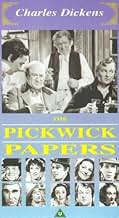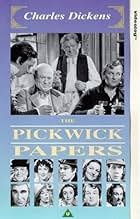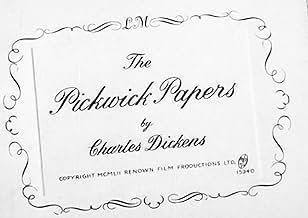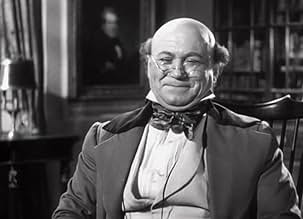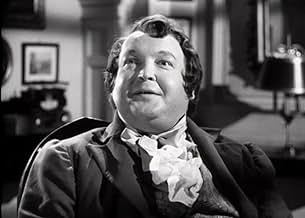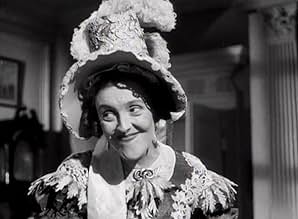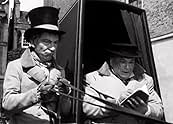Agrega una trama en tu idiomaFour wealthy Victorian gentlemen led by Samuel Pickwick set forth on an objective study of human behavior, thwarted by con artist Mr. Jingle and one of his schemes leading to Pickwick being ... Leer todoFour wealthy Victorian gentlemen led by Samuel Pickwick set forth on an objective study of human behavior, thwarted by con artist Mr. Jingle and one of his schemes leading to Pickwick being put on trial for breaking a promise to marry.Four wealthy Victorian gentlemen led by Samuel Pickwick set forth on an objective study of human behavior, thwarted by con artist Mr. Jingle and one of his schemes leading to Pickwick being put on trial for breaking a promise to marry.
- Dirección
- Guionistas
- Elenco
- Nominado a 1 premio Óscar
- 2 nominaciones en total
- Dirección
- Guionistas
- Todo el elenco y el equipo
- Producción, taquilla y más en IMDbPro
Opiniones destacadas
Dickens has been variably adapted on film and television, though will say that even the misfires/disappointments (and there are nearly as many of those as there are classics) deserve a little credit for even taking on the challenge of adapting the work of one of the (from personal perspective) most difficult to adapt authors. This 1952 film version of 'The Pickwick Papers' may not be one of the definitive adaptations of any of Dickens' work, and there is a slight preference for the 1985 mini-series with Clive Swift and Patrick Malahide. It is though very, very good, with many great qualities, and as good a film version of this particular story as one can make do with. As an adaptation it is a very solid and respectful one, with the spirit certainly intact and lots of recognisable elements. There are omissions/abridgements, but they were tasteful and didn't affect the coherence of the storytelling at all and it is completely understandable as to why there would be some condensation with literature as lengthy and complicated as that of Dickens.
It, the film that is, may be on the slightly primitive side visually, though the production and particularly costume designs are handsome enough.
Some parts are played a little too broadly, such as the romantic misadventures.
However, as said, a nice job is done with the production design and the costumes. Antony Hopkins' music score has an appealing jauntiness that matches the atmosphere and spirit of the storytelling to a tee. 'The Pickwick Papers' is from start to finish directed with precision and class by Noel Langley, who allows the story to have plenty of momentum without rushing, letting parts breathe when necessary too without grinding things to a halt.
On a writing and acting level, 'The Pickwick Papers' is pretty much a triumph. A great job is done with the adapting of the material, it is episodic (so is the book) but it doesn't read too much of a series of highlights which can be a danger with Dickens. Another danger is keeping sprawling and complicated storytelling coherent and not disjointed or choppy, 'The Pickwick Papers' to me suffered from neither of those two things and had no issues following what was going on (one could argue though that familiarity with the source material may be in order). The script is literate and thought-provoking, as well as wonderfully witty, Dickens' prose really shines here. The script and film have been criticised for being talky and wordy, don't consider them fair criticisms as Dickens is talky and wordy and am not saying that in a bad way despite how that sounds.
James Hayter is the full embodiment of Pickwick, while Nigel Patrick is similarly on superb form as a deliciously rouguish Jingle. Harry Fowler is a memorable Weller, James Donald is appealing as Winkle and Kathleen Harrison is especially excellent of the female cast.
All in all, very good film and adaptation. 8/10 Bethany Cox
Not in the same league as the David Lean-directed 'Great Expectations' and 'Oliver Twist' which preceded it, this film, directed by Noel Langley, is nevertheless not bad. It is entertaining, with an excellent cast ranging through character actors such as James Donald, Hermoines Baddeley and Gingold, Nigel Patrick, and William Hartnell; through to scene stealers like Joyce Grenfell.
It distills rather a wordy novel well, and provides it with the language of cinema to get the point across. Not an expensive production, but with some nice touches, such as Kathleen Harrison's twitchy Rachel; Mr Jingle's deck of cards; the runaway horse; and an early display of outraged bluster from Hattie Jacques, which she would repeat two decades later as a member of the Carry On team.
This film is adapted from the Dicken's source novel and restricts itself to some of the best sequences from the long tome.
You have the caddish Mr Jingle getting others in all sorts of scrapes including getting Mr Winkle involved in a duel. There are scenes of elopements and nearly elopements again with Mr Jingle trying to get away with the loot.
A misunderstanding leads to a court case involving a supposed broken promise of a marriage leading Dickens to have a swipe at lawyers and a sequence in a debtor's prison which suddenly switches the film from its comic mode to serious social issues of Victorian Britain.
James Hayter is very good as Pickwick, Nigel Patrick is a hoot as Jingle, Harry Fowler is memorable as Weller.
It is not the best adaptation of a Dickens novel from that era being rather low budget but amusing enough.
"Pickwick" is about 850 pages long, and has a shaggy dog construction. Dickens wrote a picaresque novel here, with the Pickwick Club members exploring England, and falling into many misadventures. They are supposed to be sending papers back to their club about their adventures, for they are a learned society. In one great moment in the novel (but not in the movie, unfortunately), they think they find a curiosity - a stone with the words "Bilst umpshi mark +). Their paper on this gains them immense public adulation for their scholarship, but one critic (who is kicked out of the Pickwick Club) investigates and says it should say "Bill Stumps, his mark "+". Nobody cares about the nay-sayer.
One aspect of the novel that is not in the film was Dickens addition of about seven or eight short stories the group hears or reads while on their tours. Dickens wanted to vary his novel, and he would do this again in "Nicholas Nickleby" briefly at the start of that novel. In 1841 Dickens began a large scale literary project called "Master Humphrey's Clock" in which Master Humphrey and his friends (including Samuel Pickwick, Sam Weller, and Tony Weller) tell stories, but two of the stories expanded into full scale novels: "The Old Curiosity Shop" and "Barnaby Rudge". After "Master Humphrey's Clock" Dickens never again wrote a book of just short stories (his "Christmas Novels" were not written and published together but over the years). An occasional short story like "Hunted Down" was published on its own.
The film is a nice distillation of the best sequences in the novel, such as the great lawsuit of "Bardell v. Pickwick" (Dickens first magnificent swipe at British law). Of particular notice in the film is the performances of Nigel Patrick as the trouble making scamp Jingle, and James Hayter as Pickwick (his only real starring role). Jingle (who's dialog looks like a telegram in the novel)is played as a charming rogue by Patrick. When he nearly gets Mr. Winkle (James Douglas) into a duel with two dyspeptic military doctors (with the immortal names of "Dr. Payne" and "Dr. Slammer"), after one diatribe from them Patrick riffles a deck of cards like a "Bronx Cheer". Hayter, a popular character actor in British film and television, had a smooth and warm sounding voice, and (in observing prison conditions) makes the phrase "How pitiable" actually sound correct for the first time. It is not the complete novel - which you should read and enjoy - but it is a nice introduction to it.
¿Sabías que…?
- TriviaAlthough the film was released in England in 1952 and opened in New York in 1954, it was not nominated for Oscars until 1956, due to its not having played in Los Angeles until then.
- ErroresThe pony trap shown outside the coach-house is not the same pony trap that Mr Pickwick and others are seen riding on in the next scene.
- Citas
Nathaniel Winkle: Gentlemen, Mr. Jingle is the viper in our midst.
Samuel Pickwick: Viper?
Nathaniel Winkle: Viper, sir.
Tracy Tupman: Nonsense, Winkle.
Samuel Pickwick: Nonsense, Winkle.
Augustus Snodgrass: N-nonsense, Winkle.
Nathaniel Winkle: Very well, then... we shall see.
- Créditos curiososClosing credits finish with The End of The Pickwick Papers
- Versiones alternativasAlso available in a colorized version.
- ConexionesFeatured in Arena: Dickens on Film (2012)
Selecciones populares
- How long is The Pickwick Papers?Con tecnología de Alexa
Detalles
- Fecha de lanzamiento
- País de origen
- Idioma
- También se conoce como
- Die wunderlichen Erlebnisse des Mr. Pickwick
- Locaciones de filmación
- Nettlefold Studios, Walton-on-Thames, Surrey, Inglaterra, Reino Unido(studio: produced at)
- Productora
- Ver más créditos de la compañía en IMDbPro
- Tiempo de ejecución1 hora 49 minutos
- Color
- Relación de aspecto
- 1.37 : 1
Contribuir a esta página


